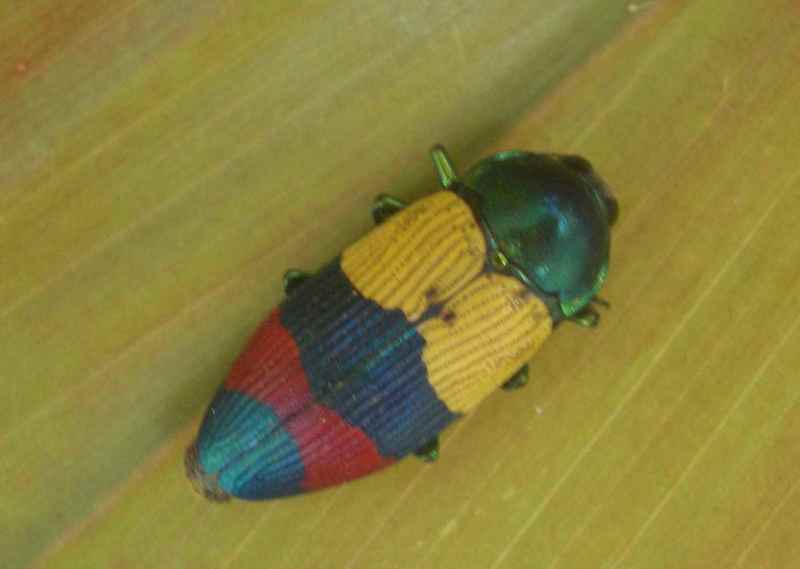Buprestidae
From Wikipedia, the free encyclopedia
Scientific classification
Kingdom: Animalia
Phylum: Arthropoda
Class: Insecta
Order: Coleoptera
Suborder: Polyphaga
Infraorder: Elateriformia
Superfamily: Buprestoidea
Family: Buprestidae Leach, 1815
Genera: About 450 genera;
[Photo] Australian buprestid beetle Temognatha alternata. Cooktown, Australia 2.6cm long. Date: 11 December 2006. Author: John Hill (http://en.wikipedia.org/wiki/User:John_Hill). Copyright (C) 2006 John Hill
Permission is granted to copy, distribute and/or modify this document under the terms of the GNU Free Documentation License, Version 1.2 or any later version published by the Free Software Foundation; with no Invariant Sections, no Front-Cover Texts, and no Back-Cover Texts. A copy of the license is included in the section entitled "GNU Free Documentation License". |
Buprestidae is a family of beetles, known as jewel beetles or metallic wood-boring beetles because of their glossy iridescent colors. The family is among the largest of the beetles, with some 15,000 species known in 450 genera. The larger and more spectacularly colored jewel beetles are highly prized by insect collectors.
Shape is generally cylindrical or elongate to ovoid, with lengths ranging from 3 mm to an impressive 100 mm, although most species are under 20 mm. A variety of bright colors are known, often in complicated patterns. The iridescence common to these beetles is not due to pigments in the exoskeleton, but instead physical iridescence in which microscopic texture in their cuticle selectively reflects specific frequencies of light in particular directions. This is the same effect that makes a compact disc reflect multiple colors.
The larvae bore through roots, logs, stems, and leaves of various types of plants, ranging from trees to grasses. The wood boring types generally favor dying or dead branches on otherwise-healthy trees, while a few types attack green wood; some of these are serious pests capable of killing trees and causing major economic damage.
Classification is not yet well-established, although there appear to be five main lineages, which may be considered subfamilies, possibly with one or two being raised to families in their own right, while other systems define up to 14 subfamilies. Some representative subfamilies and genera are:
Agrilinae ??? cosmopolitan, with most taxa occurring in the northern hemisphere
Buprestinae ??? cosmopolitan
Calodema ??? found only in Australia and New Guinea, usually in rain forests
Castiarina ??? about 500 species found only in Australia and New Guinea, previously considered a sub-genus of Stigmodera
Chrysochroa ??? found across Southeast Asia with two species native to Japan and one to Africa
Julodinae
Metaxymorpha ??? found only in Australia, New Guinea, and Indonesia. Usually found in rain forests.
Polycestinae
Stigmodera ??? 7 described species.
Temognatha ??? found only in Australia and New Guinea (about 83-85 species), previously considered a sub-genus of Stigmodera
Example species
Bronze birch borer Agrilus anxius
Emerald ash borer Agrilus planipennis
The Japanese "tamamushi" beetle Chrysochroa fulgidissima
http://en.wikipedia.org/wiki/Buprestidae
| The text in this page is based on the copyrighted Wikipedia article shown in above URL. It is used under the GNU Free Documentation License. You may redistribute it, verbatim or modified, providing that you comply with the terms of the GFDL. |
|

